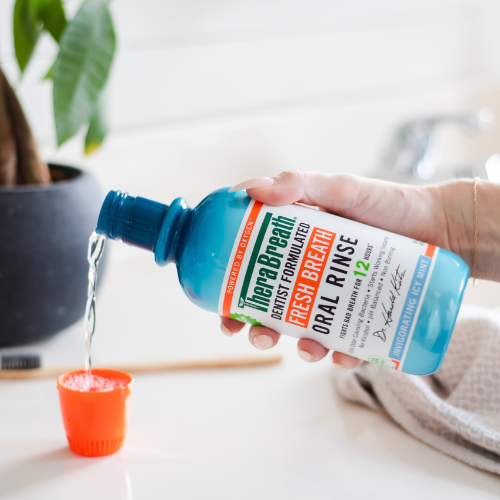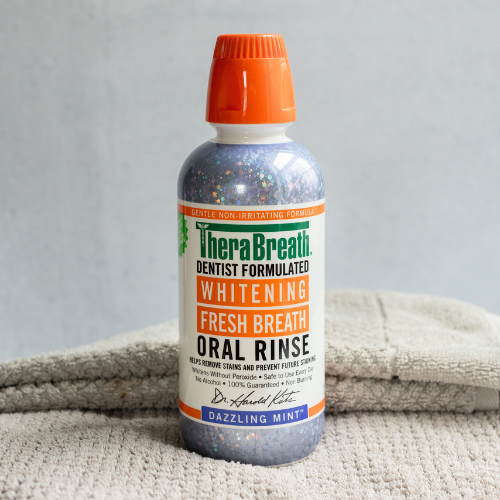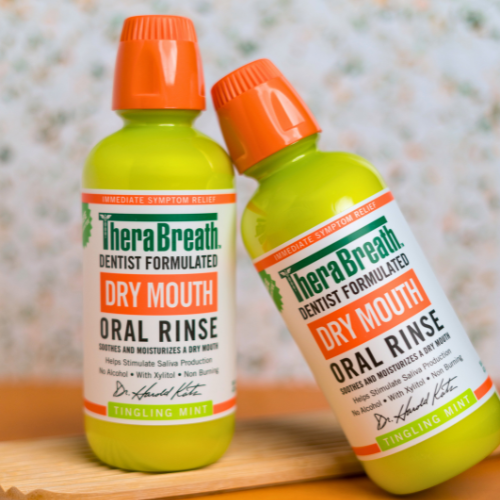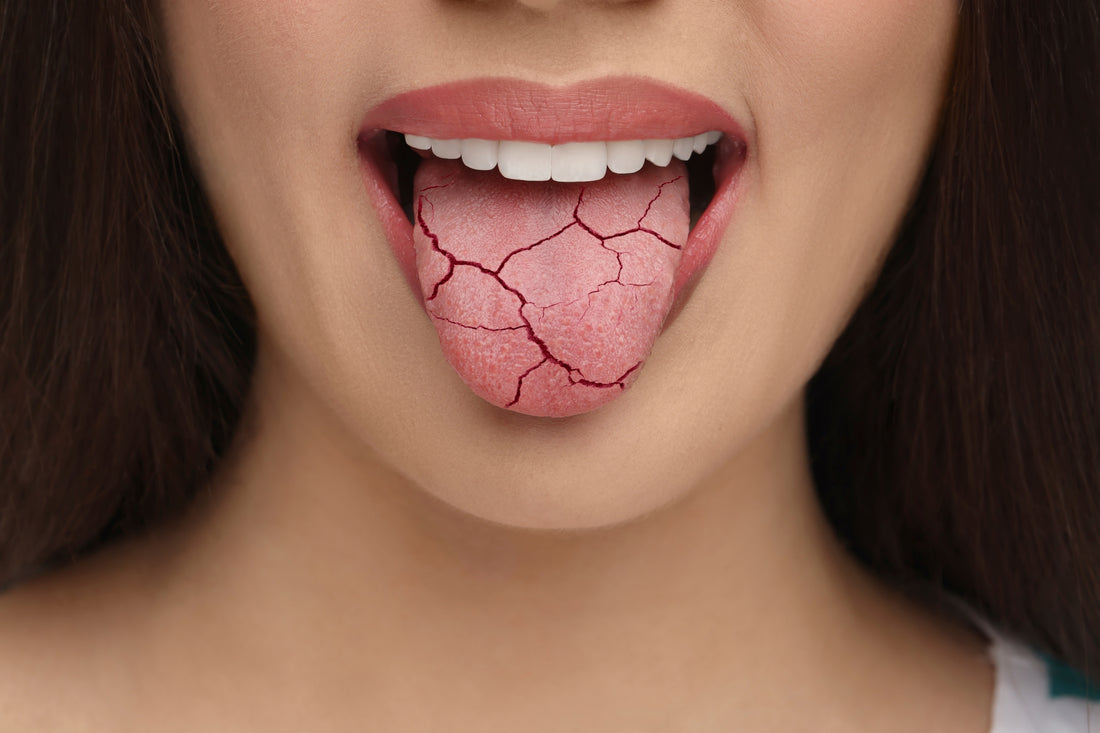
Dry Mouth Causes, Symptoms, and Remedies Guide
Share
Dry mouth, often referred to as xerostomia (the subjective sensation of a dry mouth) is a symptom of an underlying cause, resulting in a decrease or stoppage in saliva production. Dry Mouth often occurs as a side effect of specific illnesses, medications, or lifestyle choices. So why is dry mouth so bad? Learn more details here about what dry mouth is & why saliva is so important but in short, saliva contains many types of enzymes, antibacterial fluid, electrolytes & more, that help keep the body healthy. It helps prevent tooth and gum disease, eliminates food debris in the mouth, kills viruses, and discourages the anaerobic bacterial growth that produces chronic bad breath (halitosis).
Dry Mouth Causes
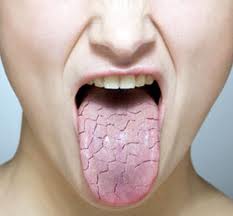
Dry Mouth has many causes, with one of the most common being a side effect of both prescription and non-prescription medications. These include muscle relaxants, sedatives, antihistamines, antihypertensives (for high blood pressure), urinary continence drugs, and antidepressants. Older adults take more medications, therefore they are more susceptible to developing dry mouth. People undergoing radiation and chemotherapy treatment for cancer may experience prolonged dry mouth symptoms. In some cases, dry mouth may be a symptom of a more serious systemic disease that impacts the entire body. Diseases associated with this include poorly controlled diabetes, cystic fibrosis, Parkinson's disease, systemic lupus erythematosus, rheumatoid arthritis, scleroderma, Sjögren's syndrome, and hypothyroidism.
Other causes include smoking or chewing tobacco, drinking alcohol, and using oral healthcare products containing drying agents such as alcohol. These activities can decrease the production of saliva in the mouth and exacerbate an already existing problem. Additionally, people who breathe with their mouths open on a consistent basis often suffer from chronic dry mouth, because doing so allows essential moisture to escape.
Dry Mouth Symptoms

Symptoms are often overlooked or unrecognized, leading to preventable discomfort or pain for the person suffering from prolonged dry mouth symptoms. The most obvious sign of dry mouth is having considerably less saliva in your mouth and feeling parched, no matter how much water or other liquids you drink. Saliva washes away the germs in the mouth, so less saliva production can lead to a proliferation of bacteria and chronic or severe bad breath (halitosis). If you experience any of the following symptoms, it is important to discuss this with your dentist or doctor as soon as possible.
- Severe bad breath
- Cracked, chapped, or inflamed lips
- Chronic mouth lesions and/or tongue ulcerations
- Dental cavities, tooth abscesses, and dental pulp infections
- Severe bad breath
- Oral candidiasis (oral thrush)
- Infection of the salivary glands
- Thick, sticky, or stringy saliva
- Difficulty swallowing or eating
- Taste disorders (loss of smell and taste)
- Unrelenting thirst
- Coughing
- Dry or raw feeling tongue
- Inflammation (redness) of the tongue
- Tongue and mouth ulcers (sores)
- Burning or tingling sensation on tongue
- Lipstick sticking to teeth
- Problems with dentures
- Hoarseness when speaking
- Sore throat
The Side Effects of Dry Mouth
Dry Tongue and Throat: Most people also experience a dry tongue and throat, which may cause a burning or tingling sensation. The tongue is moist and a healthy pink color when oral health and saliva flow are normal. The tongue has thousands of fissures in which bacteria can hide from oxygen, especially near the back, which causes the fuzzy, white coating composed of bacteria that you may notice on your tongue in the morning. This can lead to mouth irritations and other oral health issues.
Eating Problems: A dry throat can make it hard to chew and swallow, especially foods such as bread and cereal. In addition, many people with xerostomia experience issues with taste. Taste requires moist taste buds on the tongue and swallowing requires lubrication as the food goes down the esophagus. Dryness in the mouth can often lead to a clenched jaw, which inhibits proper chewing and swallowing.

Mouth Sores: When the mouth is properly lubricated with saliva, lips should stay moist, which generally helps prevent cracking and sores. Without adequate saliva, many people develop sores in the mouth, dry or cracked lips, and small sores at the corners of the mouth.
Halitosis: The body uses saliva to break down matter in the mouth, so when the mouth is dry, it provides a perfect environment for bacteria and other matter that cause halitosis to thrive. People suffering from dry mouth at night frequently awaken in the morning with bad breath. Halitosis is generally far worse in the morning due to dryness experienced at night, but can persist throughout the day.
Tooth Decay: A decrease in saliva increases the risk of developing tooth decay. This is due to the fact that saliva minimizes the harmful bacteria responsible for cavities and other oral infections.
Oral Candidiasis (Thrush): Dry mouth syndrome often leads to an oral infection called candidiasis or thrush. This fungal infection can develop overnight and persist even with proactive treatment. The primary visual symptom of thrush is a thick, cream-colored coating on the tongue, tonsils, and/or cheeks that may appear slightly red due to inflammation. Sometimes the fungal patches are painful and bleed if attempts are made to scrape off the deposits. Thrush produces halitosis, therefore a person with this condition exudes a distinctive, extremely disagreeable sulfurous odor.
Gingivitis: Often caused by dry mouth, this condition causes the gums to become red, swollen, and bleed easily, but there is usually very little or no discomfort. The good news is gingivitis is reversible with professional treatment and good oral home care. However, when gingivitis is left untreated, it can progress to more serious periodontal disease, also known as periodontitis. Many patients suffering from long term dry mouth will develop periodontal disease.
Periodontitis (also called "pyorrhea"): A serious inflammatory disease affecting the gum tissues surrounding teeth, this can lead to tooth loss. Over time, plaque produced by bacteria calcifies and pushes down between the gums and the dental roots, causing the formation of periodontal pockets. These pockets are so deep they cannot be cleaned out without professional help. Advanced periodontal disease may also affect bone growth, inhibiting the ability to bite, chew, and talk. In advanced cases, surgery is often needed to correct serious malformations of the jaw that may provoke other health issues.
Diagnosis
Typically, a healthcare professional can make a diagnosis by obtaining a thorough medical history, assessing a patient's symptoms, and performing a simple examination. However, the oral mucosa (inner lining of the cheeks and lips) often appears moist despite the patient complaining of symptoms. In such cases, a simple office procedure that measures the flow rate of saliva may be performed. Called sialometry, this involves stimulating saliva production with citric acid, then placing saliva collection devices over the parotid gland or the submandibular/sublingual gland duct orifices. This test helps determine how much saliva is being produced.
Prevention Tips

- Brush twice a day with fluoride toothpaste, which helps to remineralize tooth structure caused by dry mouth.
- Floss and brush after every meal and visit your dentist regularly.
- Although it is beneficial to use oral rinses to help combat dry mouth, only use mouthwash free of alcohol, saccharin, or foaming detergents like sodium lauryl sulfate.
- Those ingredients are known drying agents.
- Given the body is comprised primarily of water, drinking adequate water and other fluids is key to restoring saliva production.
- a female chewing gumAvoid sugary and caffeinated beverages because these are drying agents that can exacerbate dry mouth.
- Chew sugar-free gum or suck on sugar-free candy to help stimulate the salivary glands. Avoid products containing sugar and look for chewing gum and mints with xylitol, a known breath freshener.
- Avoid over-the-counter antihistamines and decongestants because they can exacerbate the problem.
- Refrain from smoking, chewing tobacco, or drinking alcohol, all of which are known to cause dry mouth.
Dry Mouth Remedies
The goal of any dry mouth treatment is to restore saliva flow. If you are suffering from dry mouth unrelated to a medication, try the above prevention tips which are also remedies. If symptoms worsen and none of these antidotes alleviate the problem, it is important to seek medical advice from a healthcare professional as soon as possible. If you are taking a medication and dry mouth is one of the side effects, talk to your doctor. He or she can either adjust the dosage or prescribe another drug which is less likely to cause dry mouth. Medications such as pilocarpine (Salagen) and cevimeline (Evoxac) stimulate saliva production and may be prescribed to restore the mouth to its naturally-hydrated state.
TheraBreath® Products to Alleviate Dry Mouth Symptoms
TheraBreath Dry Mouth Oral Rinse, the newest mouthwash in the TheraBreath line, it blends natural salivary enzymes with soothing mouth moisturizers and a natural flower extract which enhances saliva. TheraBreath Dry Mouth Oral Rinse is a non-alcohol breakthrough solution to help alleviate dry mouth symptoms. Goes far beyond just moisturizing!
During a busy day between meals, or running from meeting to meeting, you will be glad you have TheraBreath's Mouth Wetting Lozenges on hand. Sugar-free, they keep your mouth moist, enhance saliva flow, and freshen your breath with a great citrus mint flavor.
Regular use of these TheraBreath products will help provide relief from dry mouth symptoms, leaving your mouth cool, fresh, moisturized, and free of the elements responsible for chronic bad breath.
* Statements on this page have not been evaluated by the Food and Drug Administration. These products are not intended to diagnose, treat, cure, or prevent any disease. The material on this site is provided for informational purposes only. Always consult your healthcare professional before beginning any new therapy.
